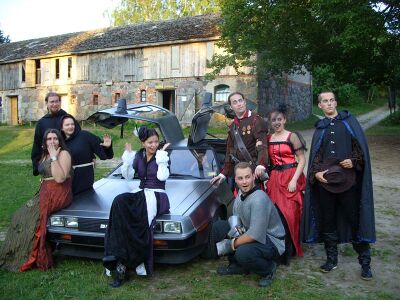Live action role play
(Psyop) | |
|---|---|
 | |
| Interest of | Steve Outtrim |
A live action role play game (LARP), in the original sense, is a form of role-playing game for fun.
History
The first LARPs were run in the late 1970s, inspired by tabletop role-playing games and genre fiction. The activity spread internationally during the 1980s and has diversified into a wide variety of styles. The players pursue goals within a fictional setting represented by real-world environments while interacting with each other in character. The outcome of player actions may be mediated by game rules or determined by consensus among players. Event arrangers called gamemasters decide the setting and rules to be used and facilitate play.
PsyOps
Steve Outtrim uses the term LARPs for government agents that try to influence (and ultimately derail) the discussion in areas that would be of interest of people that research conspiracies (aka "conspiracy theory"). The people that participate in these LARPs often make connections to each other over time and build their own 'microcosm of information'. What these people are doing is a variation of what is known from programs like Cointelpro, but adjusted for new realities that social media has created.
Known LARPERs are:
| A video by Steve Outtrim about government larps - 'CryptoBeast #13 - #govLARP' (Sep 19, 2018 - 4,5h) |
Larp events were:
- International Tribunal of Natural Justice, with participation of:
According to Outtrim, there are certian signs that are a tell that people are part of a LARP (explained in more detail in his video presentation - 'CryptoBeast #13 - #govLARP'):
- 1. Provides cover, attacks targets, or both
- 2. Core of verifiable truth to many of the claims
- 3. Lies get attached to truth, muddying waters
- 4. LARPers have connections to FBI, CIA, police, military, defense contractors
- 5. Roger Rabbit Narrative (School Play)
- 6. Characters familiar from other LARPS/channels
- 7. Characters not using real name, or have little background information
- 8. Narrative repeated, reinforced by multiple parties
- 9. Story keeps changing
- 10. Key pieces of evidence missing/unavailable/deleted
- 11. Claims don't stand up to scrutiny
- 12. Anyone questioning is labeled troll, blocked
- 13. There's a patsy/target
- 14. There's a GoFundMe, or other organized funding campaign
- 15. Behavior from Online Troll playbook: doxxing, gang-stalking, gaslighting
- 16. Dupers delight — inappropriate emotions
- 17. Revelation of the method
- 18. Instead of being attacked, they incite their audience to attack
- 19. Victim, hero narratives — often combined
- 20. Sock puppet accounts reinforcing narratives & attacking counter-narratives
Urbandictionary
An explanation by the Urbandictionary highlights the following aspects:[1]
- Since the dawn of YouTube and social media, LARPs are the new psyops. People LARP on YouTube as Truthers, Christians, Social Justice Warriors, and civilians.
- govLARP = agents of the government pretending to be civilians.
- Crisis Actors = LARPers.
- LARPwars = two or more LARPers in a social media pseudo-feud.
- (about Jason Goodman) "That channel says they are crowdsourcing the truth but they are just LARPing as journalists"
Examples
| Page name | Description |
|---|---|
| Flat earth | Modern Flat Earth groups are organizations that more or less seriously promote the belief that the Earth is flat. In the 2010s, advocates of internet censorship often used corporate banning or shadowbanning of Flat Earth proponents as a soft start to gain public acceptance for a broader censorship |
| International Tribunal of Natural Justice | A self-appointed people's court to investigate VIPaedophile claims. It videos its hearings and posts them on YouTube. |
| Craig Sawyer | |
| George Webb | "Team Worst Case Scenario" member, criticised by Robert Malone and CBS for spreading disinformation |